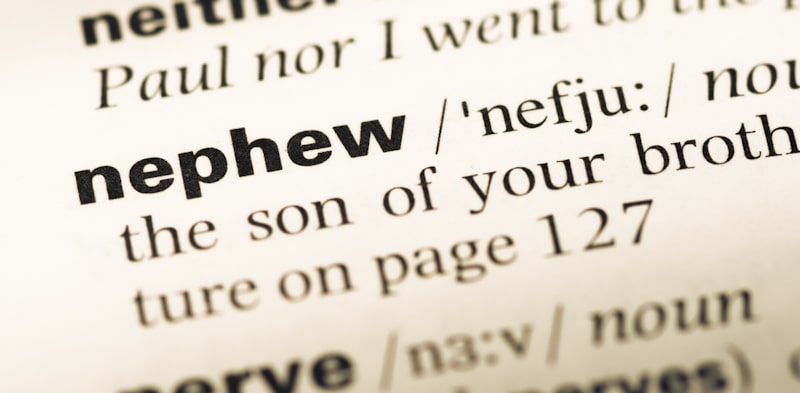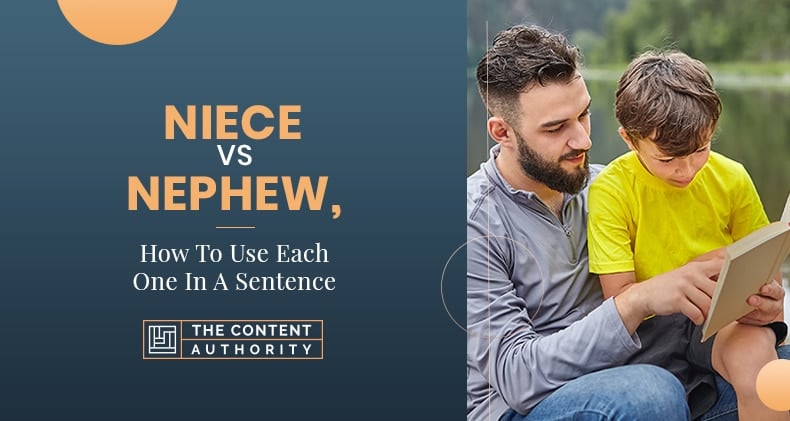In multiple languages, the vocabulary is so extensive that you can find the opposite of basically every word. The English language is not an exception. As a result, you can find words that mean the same or the opposite of almost every word. Words that mean the opposite are known as antonyms. In this article, we will explain two terms that, even though they refer to the same concept, are antonyms of each other.
The term “niece” is used when referring to the daughter of a sibling of yours. Meanwhile, the term “nephew” is used when referring to the son of a sibling of yours. The terms “niece” and “nephew” are linked to the gender of the person we are referring to, but they indicate the same relationship.
Definition
The kinship system refers to the commonly known family tree. This system is based on the direct relationship with ancestors or descendants. There are two types of kinship systems: lineal and collateral.
The lineal kinship is based on the direct ancestors and descendants only. For example, based on an ancestral kinship system, your family tree will only show your father, mother, grandfather, grandmother, and so on in the ancestor’s category. Your sons, daughters, and grandchildren, however, will only appear under the descendant sections.
The collateral kinship is based on a more global perspective of family. In the collateral kinship system, your family tree will include the brothers and sisters of your parents, your grandparents, and so on in the ancestor’s section. On the other hand, all your cousins and other siblings like brothers and sisters will be in the same line as you in the family tree. Lastly, on the descendant’s portion, there will be all your nieces and nephews, alongside your sons and daughters, and so on in a never-ending chain.
The terms “niece” and “nephew” are used in a collateral kinship system. Their definitions are the following:
- Nephew is the son of someone’s sibling. Therefore, nephew is the male term.
- Niece is the daughter of someone’s sibling. Therefore, niece is the female term.
That is the difference between the two terms. The words “nephew” and “niece” refer to the same relationship but are gender-bound. Because of this gender difference, the two terms are known as antonyms for each other.
A third term is the gender-neutral one that represents both simultaneously, and that is nibling. Still, this term is used in specialist literature and not in the day-to-day scenario.
The inverse relationship of niece or nephew is an aunt or uncle, which means the person with a niece or a nephew is an aunt or uncle. The relationship between aunt/uncle and niece/nephew is a second-generation one. Because two generations separate the aunt/uncle from the niece/nephew, meaning that they are 25% related.
There are cultures where the relationship between aunt/uncle and niece/nephew is as close as the one between mother/father and daughter/son.

Origin and Evolution Of The Words
The term “niece” and “nephew’s” origin comes from the same base: the Latin term “nepotem,” which means familial loyalty. From there, the French language took it. The Latin term evolved in two ways in the French language, for the male version was “neveu,” which resulted in the term nephew. On the other hand, the second form was the term “nece” that gave birth to the word niece.
In the past, there were other ways to call this relationship. We can find these terms in classical literature. For example, when referring to the term nephew in the past, the term used was sister-son in the case of the sister and brother-son in the case of the brother. Alternatively, when referring to the niece, the term sister-daughter in the case of the sister or brother-daughter in the case of the brother.
Synonyms
Every language has different ways of expressing a similar idea. This section will present other words and phrases that hold identical meanings as the terms niece and nephew.
For niece: all the terms that refer to the relationship of someone’s sibling’s daughter.
- Grandniece is the granddaughter of someone’s sibling.
- Great-niece is the same as grandniece. This is another way of describing the same relationship.
- Niece-in-law is the wife of your nephew.
- Sororal niece is the daughter of your sister.
- Fraternal niece is the daughter of your brother.
- Kinswoman
For nephew: all the terms that refer to the relationship of someone’s sibling’s son.
- Grandnephew is the grandson of someone’s sibling.
- Great-nephew is the same as grandnephew. This is another way of conveying the same relationship.
- Nephew-in-law is the husband of your niece.
- Sororal nephew is the son of your sister.
- Fraternal nephew is the son of your brother.
- Kinsman
Antonyms
Some words have the opposite meaning. The name for this is an antonym. Next, we will present a list of words that mean the opposite of the terms niece and nephew.
For niece: terms that do not mark the relationship of someone’s sibling’s daughter.
- Nephew
- Kinsman
- Uncle
For nephew: terms that are not marking the relationship of someone’s sibling’s son.
- Niece
- Kinswoman
- Aunt
Examples Of Both Terms
This section will present multiple sentences that will serve as examples of using the terms “niece” and “nephew.”
- My 2-year-old nephew was playing with his puppy.
- My friend had a nephew, and sadly he passed away.
- The movie is based on a true story, where the main character asked his nephew to execute his will.
- My nephew loves bikes, so I am going to give him one for his birthday.
- Because Michael and his nephew are very close, Michael contracted smallpox from him.
- My wife’s nephew works at Google as a software engineer.
- My nephew is an inspiration for others and the entire family.
- In King Arthur’s tale, there are some knights who were his nephews. However, they were referred to as brother-son.
- She gave her foolish niece some good advice.
- In the Lord of the Rings, J.R.R. Tolkien uses the term sister-daughter to refer to the niece.
- My niece has grown so fast. She is now ten years old.
- There was much chatter about the boss’s niece getting the job instead of the rest of the candidates.
- He entrusted his niece with the task.
- In family gatherings, my nieces are the life of the party.
- They introduced the old man’s niece at the party last night.
- Jenny and Melissa McCarthy are cousins, so their daughters are each other’s nieces.
Conclusion
The English vocabulary has a little bit of everything. It has words that mean the same but are written differently, also words that are the opposite of one another.
In this article, we presented different types of antonyms. For example, the words niece and nephew refer to the same relationship but are bound to a specific gender. Gender is the social or physical condition of being male or female. In English, there are not many nouns that are gender bound, but there are exceptions, like in the case of niece and nephew.
With that being said, the gender to which we are referring will indicate the use of niece or nephew. If we refer to the daughter of our brother or sister, we use niece, and on the other hand, if we refer to the son of our brother or sister, we use nephew.
Shawn Manaher is the founder and CEO of The Content Authority. He’s one part content manager, one part writing ninja organizer, and two parts leader of top content creators. You don’t even want to know what he calls pancakes.



